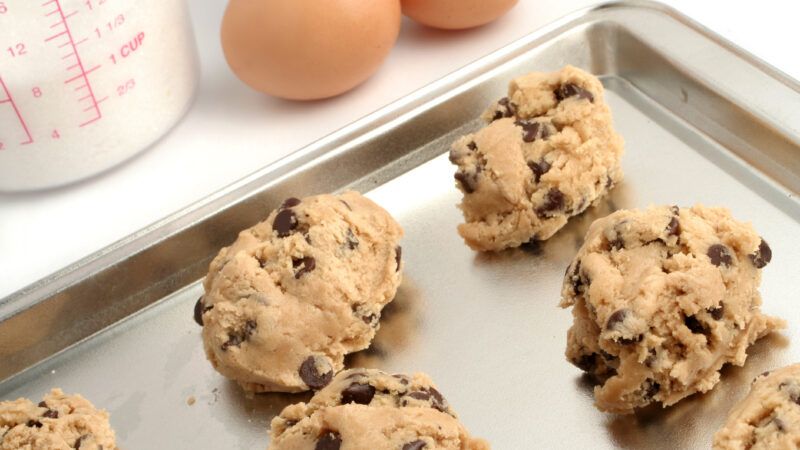A Home-Based Baker Shouldn't Have To Choose Between Her Dog and Her Business
Each state has different cottage food laws that don’t actually protect public health and safety.

Hula is a good girl. She gets overly excited when guests visit, and sometimes she pokes her nose through the backyard fence and barks. But she follows one important rule: She avoids the room between the kitchen and driveway.
No dogs are allowed inside. Hula, a 7-year-old Belgian shepherd mix, learned quickly when her human parents renovated the space in November 2022, adding an oven, freezer, cooktop, and mixers. "She knows not to go in there," says Hula's mom, who uses the pet-free zone for a homemade cookie business and asked to remain anonymous for this piece.
The door mostly stays closed anyway, creating clear boundaries between the main kitchen for family meals and the workspace for "cottage food," which refers to homemade food for sale. The setup eliminates any sanitation concerns about indoor pets.
"I have really high standards for myself," says Hula's mom. "My product is a reflection of me and my integrity."
Despite the safeguards, Hula's mere existence jeopardizes the business. North Carolina, where the family lives, bans pets in homes used for cottage food production. The state Department of Agriculture and Consumer Services makes no exceptions. Even a goldfish or hamster could turn an otherwise legal business into a criminal enterprise.
The pet prohibition puts Hula's mom in a bind. She could stop selling cookies, move to another state, or lease space in a commercial kitchen, which would mean driving 30 minutes each way to bake on a fixed schedule while paying thousands of dollars in rent—killing flexibility and profit.
The other options are unthinkable. The family could return Hula to the shelter where they rescued her as a puppy. Or they could banish her permanently to the backyard. Hula's mom refuses.
"Your pet is part of your family," she says. "I don't think it's fair to make me choose between business and family."
Rather than comply, Hula's mom took her cottage food operation underground. She pays taxes and obeys other laws, but she skipped the mandatory home inspection and certification. Now she must look over her shoulders when she bakes. She cannot advertise, participate in big community events, or do anything else to draw attention to herself.
Too much success could alert government agents, who could show up and bust her. No puppy dog eyes could stop the assault on economic liberty—the right to earn an honest living in a safe and responsible manner.
The zero-tolerance pet policy is just one example of misguided and sometimes unconstitutional cottage food restrictions nationwide. All 50 states and Washington, D.C., authorize these home-based businesses. But most jurisdictions also hold them back.
Our public interest law firm, the Institute for Justice, filed lawsuits in Minnesota, Nebraska, and New Jersey to end some of the most stifling cottage food regulations. We sued Wisconsin twice. Yet these are not the only states with problems.
Connecticut, Delaware, Maryland, and Washington state cap annual revenue at $25,000, leaving little room for profit after expenses. Hawaii bans online sales and mail-order delivery. Many states demand laboratory testing of acidified foods.
Massachusetts requires inspections, but does not set uniform standards. Cottage food producers must navigate different rules in 351 cities and towns. Some municipalities decline to set up inspection programs, making it illegal to sell a single homemade cookie under any circumstance. Other municipalities set the bar impossibly high. One aspiring cottage food producer failed a Massachusetts home inspection because her laminate countertop had a freckle-sized chip near the sink.
The biggest difference nationwide involves cottage food types. Every state allows the sale of homemade cookies, bread, and other shelf-stable foods. But that's where the agreement ends. Some states allow homemade popcorn and chocolates. Other states don't. Some states allow homemade pickles and canned vegetables. Other states don't.
Most states ban the sale of homemade foods that require refrigeration. But a handful of states allow it—putting cheesecakes, pumpkin pies, and fresh salsas on the menu. Seven states allow the sale of homemade meals such as pizza. Overall, Wyoming tops the chart and Delaware is the biggest loser for cottage food freedom on an Institute for Justice report card.
The disparity produces something like cottage food roulette. Producers who live in places with friendly laws are lucky winners. Hula's mom and many others are losers, and they rarely get an apology.
Regulators who make their lives difficult claim the meddling is necessary to protect public health and safety. Yet the patchwork of laws nationwide undercuts the argument. Real-world experience shows cottage food is safe no matter where a person lives.
California allows the sale of homemade foods containing meat. Georgia limits cottage food producers to a narrow list of authorized fare. The difference is huge, but the result is the same: little or no evidence of harm.
Arizona lawmakers considered the data and passed one of the nation's strongest food freedom laws on April 13, 2023. Democratic Gov. Katie Hobbs responded with a veto, citing the imagined public health and safety problems that have yet to materialize anywhere.
Hula stays out of politics. But her mom is ready to growl about the cottage food obstacles—especially the pet prohibition in North Carolina. "This makes me mad," she says. "It seems so arbitrary."


Show Comments (215)